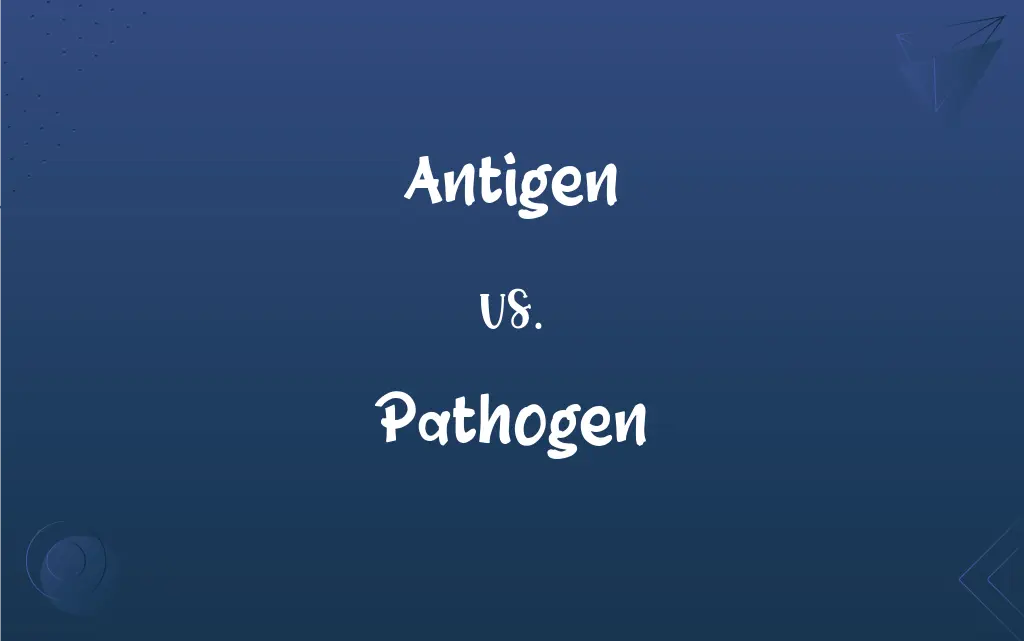Antigen vs. Pathogen: What's the Difference?
Edited by Janet White || By Harlon Moss || Updated on October 27, 2023
An antigen is a substance that triggers an immune response, while a pathogen is a microorganism causing disease.

Key Differences
An antigen is essentially a molecule or molecular structure that is recognized by the immune system, typically on the surface of pathogens. A pathogen, on the other hand, is a harmful microorganism that can cause diseases in its host.
While antigens can be found on a variety of substances, both harmful and benign, pathogens are distinctly harmful entities, such as bacteria, viruses, fungi, and parasites, that can invade bodies and cause illness.
The primary role of an antigen is to stimulate the body's immune system, particularly to produce antibodies. Pathogens have a different role; they invade and attack the body's systems and cause disease.
Not all antigens come from pathogens. Some antigens are part of the body's normal cells or are found in benign substances like pollen. Conversely, all pathogens have antigens, which the immune system identifies to target them.
Vaccines often contain antigens (not active pathogens) to stimulate an immune response without causing the disease. A pathogen is what a vaccine aims to protect against by utilizing these harmless antigenic components.
ADVERTISEMENT
Comparison Chart
Definition
Substance triggering an immune response
Microorganism causing disease
Source
Found on various substances, including pathogens
Bacteria, viruses, fungi, parasites
Role in the body
Stimulates immune response
Causes disease
Presence in vaccines
Often used in inactive or attenuated form
Typically not in active form
Relation to immune system
Targeted by the immune system
Possesses antigens targeted by the immune
ADVERTISEMENT
Antigen and Pathogen Definitions
Antigen
Antigens are often found on the surface of pathogens.
Scientists study the antigen structures of viruses for drug development.
Pathogen
Pathogens can invade organisms and produce illness.
Proper hygiene can reduce the spread of pathogens.
Antigen
An antigen is identifiable by specific antibodies.
Once exposed to an antigen, the body produces antibodies to combat it.
Pathogen
Pathogens include bacteria, viruses, and fungi.
Different antibiotics target different bacterial pathogens.
Antigen
An antigen triggers an immune response when detected.
Pollen serves as an antigen for many allergic reactions.
Pathogen
Pathogens are agents of infectious diseases.
The pathogen responsible for tuberculosis primarily affects the lungs.
Antigen
An antigen is a molecule recognized by the immune system.
The flu virus has distinct antigens that change from year to year.
Pathogen
A pathogen can spread in various ways, including air, water, and contact.
Contaminated water sources can transmit waterborne pathogens.
Antigen
Antigens are substances that induce the production of antibodies.
The presence of the antigen in the vaccine helps build immunity.
Pathogen
A pathogen is a disease-causing microorganism.
The common cold is caused by a viral pathogen.
Antigen
A molecule that is capable of binding to an antibody or to an antigen receptor on a T cell, especially one that induces an immune response. An antigen is usually a foreign substance, such as a toxin or a component of a virus, bacterium, or parasite.
Pathogen
An agent that causes disease, especially a virus, bacterium, or fungus.
Antigen
(immunology) A substance that induces an immune response, usually foreign.
Pathogen
Any organism or substance, especially a microorganism, capable of causing disease, such as bacteria, viruses, protozoa or fungi. Microorganisms are not considered to be pathogenic until they have reached a population size that is large enough to cause disease.
Antigen
Any substance (as a toxin or enzyme) that stimulates the production of antibodies
Pathogen
Any microorganism which causes disease; a pathogenic organism; an infectious microorganism; a bacterium, virus, or other agent which can cause disease by infection; - opposed to zymogene. The spelling pathogene is now archaic.
Pathogen
Any disease-producing agent (especially a virus or bacterium or other microorganism)
FAQs
Are all pathogens harmful?
Most pathogens can cause disease, but some can be harmless under certain conditions.
Can an antigen cause disease?
No, antigens stimulate the immune system, but pathogens are the disease-causing agents.
How does the body recognize antigens?
The body uses specific antibodies to identify and target antigens.
What is a pathogen?
A pathogen is a harmful microorganism that causes diseases.
Are antigens only found on pathogens?
No, antigens can be found on various substances, not just pathogens.
What types of microorganisms can be pathogens?
Bacteria, viruses, fungi, and parasites are all types of pathogens.
Can a single pathogen have multiple antigens?
Yes, many pathogens have multiple antigens on their surfaces.
Are antigens specific to certain diseases?
Yes, specific antigens correspond to specific pathogens and diseases.
Can the body remember previously encountered antigens?
Yes, the immune system has a memory response, allowing quicker reactions to previously encountered antigens.
How does the immune system respond to pathogens?
The immune system identifies antigens on pathogens and targets them to neutralize or eliminate the threat.
Can you be immune to certain pathogens?
Yes, exposure to a pathogen or its antigen can lead to immunity against future infections.
How do antigens differ from antibodies?
Antigens are recognized by the immune system, while antibodies are proteins produced by the immune system to target antigens.
Can a person carry a pathogen without being sick?
Yes, some people can be asymptomatic carriers, having the pathogen but not showing symptoms.
How are pathogens and antigens related?
Pathogens are disease-causing agents that possess antigens, which are recognized by the immune system.
What is an antigen?
An antigen is a substance that triggers an immune response in the body.
Can pathogens become resistant to treatments?
Yes, some pathogens can mutate and become resistant to treatments like antibiotics.
Are all antigens harmful?
No, some antigens, like those from food or benign substances, are harmless.
How do vaccines use antigens?
Vaccines often contain weakened or inactive forms of antigens to train the immune system without causing disease.
How do pathogens spread?
Pathogens can spread through air, water, food, and physical contact.
Why are antigens important in vaccines?
Antigens in vaccines stimulate the immune system to produce antibodies without causing disease.
About Author
Written by
Harlon MossHarlon is a seasoned quality moderator and accomplished content writer for Difference Wiki. An alumnus of the prestigious University of California, he earned his degree in Computer Science. Leveraging his academic background, Harlon brings a meticulous and informed perspective to his work, ensuring content accuracy and excellence.
Edited by
Janet WhiteJanet White has been an esteemed writer and blogger for Difference Wiki. Holding a Master's degree in Science and Medical Journalism from the prestigious Boston University, she has consistently demonstrated her expertise and passion for her field. When she's not immersed in her work, Janet relishes her time exercising, delving into a good book, and cherishing moments with friends and family.
































































